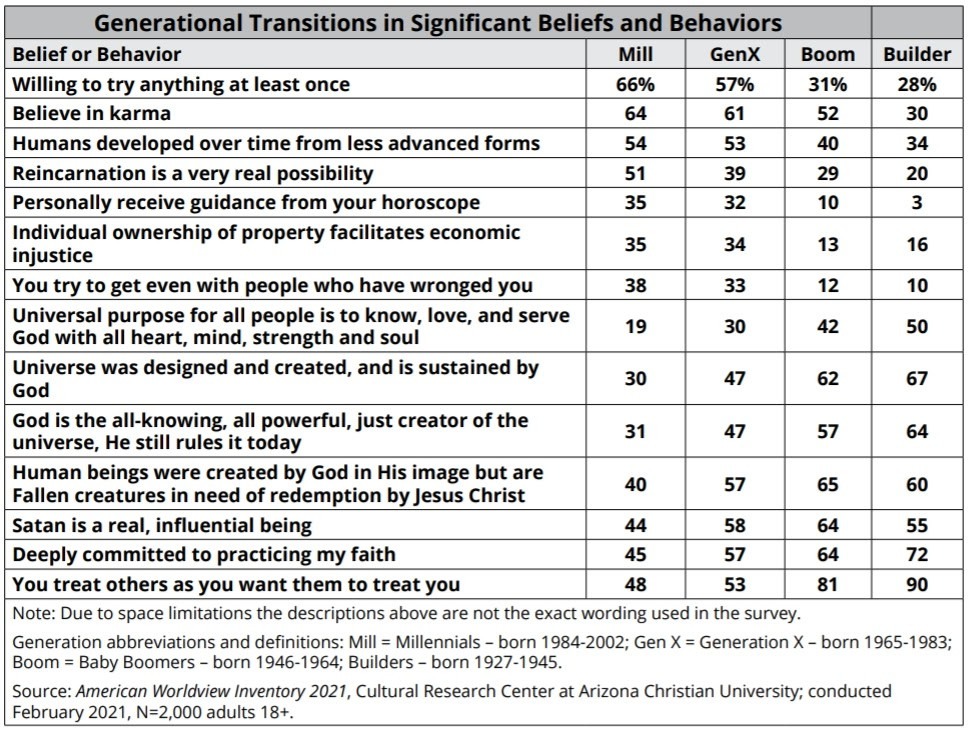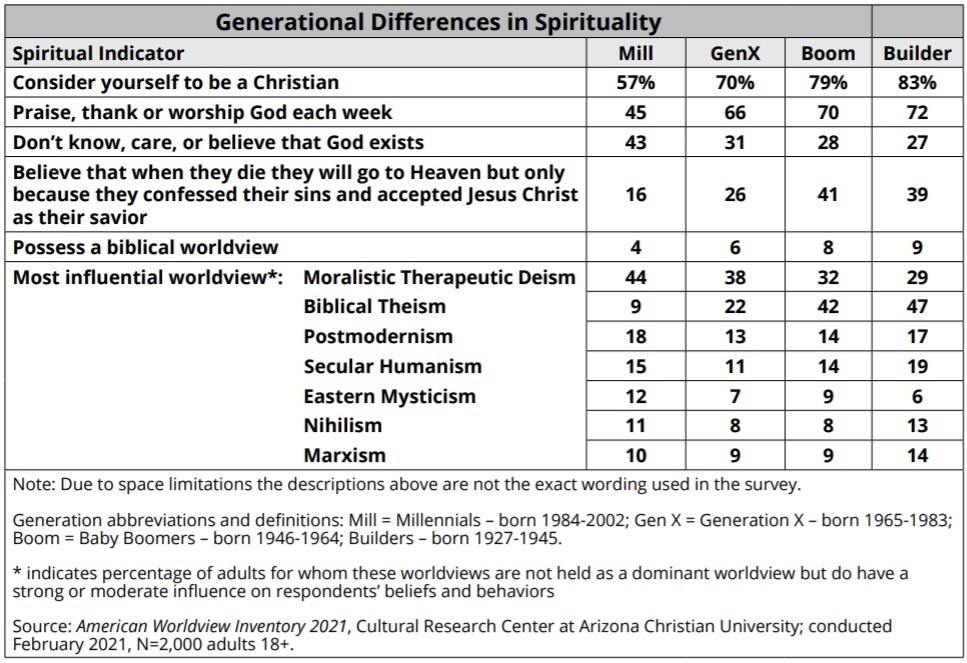
In America’s religious landscape, we witness one of the most profound worldview transitions, and Millenials are at the heart of it. Adults age 18 to 36 — otherwise known as Millenials — have an extensive perception of how humanity relates to the universe. Younger Americans don’t believe or even care about the standard theory of a god’s existence.
The Arizona Christian University’s(ACU) Cultural Research Center (CRC) conducted the survey “American Worldview Inventory 2021” on April 13, 2021. Release #01 is “America’s Dominant Worldview” of conflicting values and beliefs.
This survey includes several dozen questions that cover eight categories of worldview beliefs and practices. The CRC divided contributors into four generational segments: the Millennials (born 1984-2002), the Gen-X generation (1965-1983), the Baby Boomers (1946-1964), and the Builders (1927-1945).
As expected, each generation revealed different views when it came to specific beliefs and practices. The CRC research exposed how some of the most significant differences are in their definitions of a successful life, views on abortion, Biblical practices, and things like karma and horoscopes. However, the Boomers & Builders share more similarities. Likewise, Gen X and Millennials were similar.
The majority of Builders believe in treating others as you would want them to treat you. But only half of Millennials agree.
As much as 66% of Millennials say they are willing to try anything at least once, only 28% of Builders agree.
Forty-three percent of Millennials say that they either don’t believe, don’t know, or don’t care about the existence of God, compared to 28% of Boomers.
Almost half of all Boomers believe they will go to heaven when they die if they accept Jesus as their Savior and confess their sins, compared to only 16% of Millennials and 26% of Gen X.
Thelatest report was published on May 12, titled: “AWVI 2021 Results – Release #03: The Seismic Generational Shift in Worldview: Millennials Seek a Nation Without God, Bible, and Churches.” This survey identifies distinct differences between the older Builders generation and the Millenials as the latter continues to distance themselves from beliefs in ‘God.’
When I have children they will go to church but I will also explain why we as a family attend. I believe that many millennials have a disdain for the church and things of God because they were dragged to it out of religion and not explained it through the lens of relationship
— Nathan (@nathanesnowden) February 25, 2019
This latest AWVI 2021 survey identifies striking differences between older Americans and Millenials, as the latter continues breaking away from the belief in a god. Instead, they reimagine our world without the bible, churches, or any claim of God.

Millennials go farther than any recent generation in cutting ties with Christian beliefs and bible teachings.
The report provided several examples showing that Millennials (ages 18 to 36) are more likely than all other generations to deny biblical ideology in favor of more worldly spiritual practices and perspectives:
- Millennials are more likely to define success in terms of personal happiness. They are likely to accept abortion when the pregnancy interferes with personal enjoyment. They accept premarital sex as the norm. Millennials are more open to believing the possibility of reincarnation, and they embody liberal positions on humanistic social issues.
- They are much less likely to embrace biblical teachings regarding God’s nature, creationism, ‘original sin’ and salvation, biblical morality, and the purpose of humanity.
In spite of these generational differences, the biblical worldview has declined among all generations. An earlier AWVI 2021 report identified the dominant worldview among the four generations—Millennials (age 18 to 36), Gen-Xers (age 37 to 54), Baby Boomers (age 55 to 74), and Builders (age 75 and older)—to be Syncretism, a mishmash of conflicting, often inconsistent beliefs and values.

“Gen X and the Millennials have solidified dramatic changes in the nation’s central beliefs and lifestyles,” according to CRC director of research, sociologist George Barna, “The result is a culture in which core institutions, including churches, and basic ways of life are continually being radically redefined.”
Barna believes the seismic shift in America’s religious landscape began nearly 60 years ago when Boomers pushed for progressive changes.
Millennials mirror the aggressiveness of the Boomers, who were determined to reshape culture to their inclinations.
“It is hard to imagine a louder, clearer, and more direct challenge to the future of the Christian faith in the United States,” concluded Barna. “If Christian churches, pastors, schools, and individuals believe that a biblical Christian faith is important—not just for themselves but also for our nation and the world beyond it—time is running out to aggressively and strategically act on that belief, before those who so vehemently disagree succeed in destroying the freedom and opportunity to preserve the ways of God.”
